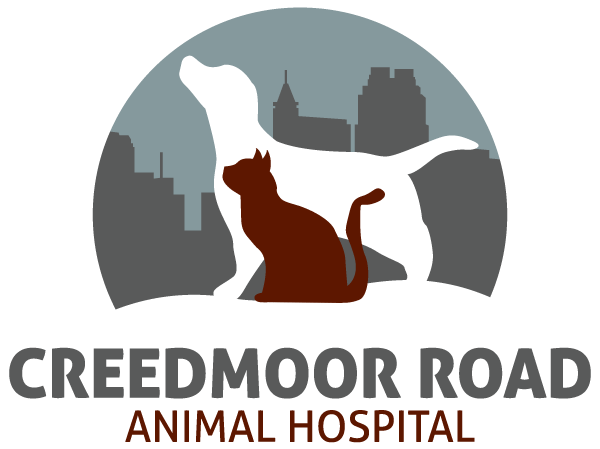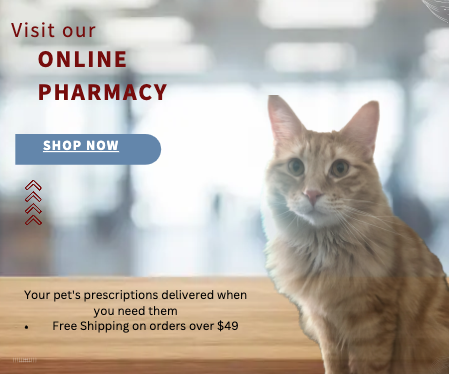When it comes to your pet’s health, their vision is just as important as any other aspect of their well-being. Vet ophthalmology is a specialized field focused on treating eye conditions in animals. It helps ensure they maintain optimal vision throughout their lives.
If you notice any changes in your pet’s eyes or vision, don’t wait to seek professional help. Creedmoor Road Animal Hospital offers specialized vet ophthalmology services to address your pet’s eye health concerns with compassion and expertise.
What is vet Ophthalmology?
Vet ophthalmology is a specialized branch of veterinary medicine for treating eye diseases in animals. Veterinary ophthalmologists undergo years of additional training to become experts in eye care. Their expertise allows them to provide eye care that general veterinarians may not be equipped to handle.
7 Signs That Your Pet Needs Vet Ophthalmology Care
- Redness or inflammation – Any noticeable redness in or around the eye can indicate infection or irritation that requires professional evaluation.
- Excessive tearing or discharge – Unusual discharge from the eyes, whether clear, yellow, or green, often signals an underlying problem that should be addressed promptly.
- Squinting or keeping the eye closed – This behavior indicates pain or discomfort and should never be ignored.
- Cloudiness or change in eye color – Changes in the appearance of the eye itself may signal conditions like cataracts or glaucoma.
- Pawing at the eye – When your pet repeatedly touches their eye, they’re trying to alleviate discomfort that requires veterinary attention.
- Visible third eyelid – If you notice the third eyelid (a membrane normally hidden) becoming visible, this can indicate an eye problem or general illness.
- Bumping into objects or disorientation – Changes in your pet’s ability to navigate familiar environments could signal vision loss.
5 Common Conditions Requiring Vet Ophthalmology Care
Corneal Ulcers
Corneal ulcers are open sores on the clear outer layer of the eye. It usually develops from trauma, infection, or underlying health conditions. These painful lesions appear as depressions or wounds on the eye surface and can lead to permanent vision loss. Vet ophthalmology treatment typically involves antibiotics, pain management, and surgical intervention.
Cataracts
Cataracts occur when your pet’s eye lenses become cloudy or opaque, resulting in blurred vision or eventual blindness. It is commonly caused by age, but can be hereditary or due to diseases like diabetes in pets. While not all cataracts require immediate vet ophthalmology care, advanced cases need surgical removal of the affected lens. Artificial lenses are then implanted to help restore vision.
Glaucoma
Glaucoma is a serious condition that creates pressure within the eye, damaging the optic nerve and retina. It can develop suddenly or gradually, leading to permanent blindness if not treated. Vet ophthalmology care focuses on reducing intraocular pressure through medications or surgery. Unlike humans, glaucoma in pets progresses faster. Which is why early detection and intervention are crucial for preserving vision.
Dry Eye (Keratoconjunctivitis Sicca)
Dry eye occurs when tear production is insufficient. It often leads to irritation, inflammation, and potential damage to the cornea. This chronic condition is caused by destruction of tear-producing glands, medications, or infections. Pets with dry eye typically show redness, thick discharge, and frequent blinking or squinting. Management usually involves artificial tears, medications to stimulate tear production, and treatments to control inflammation.
Eyelid Abnormalities
Eyelid abnormalities are often breed-related. It includes conditions such as inward-rolling lids and outward-drooping lids. They can cause significant discomfort and corneal damage. Surgical correction is typically recommended to restore normal eyelid function and position. Early intervention can prevent secondary complications like corneal scarring or chronic infections that might develop from prolonged irritation.
What does a veterinary Ophthalmologist do?
- Comprehensive eye examinations – Vet ophthalmology professionals perform detailed evaluations using specialized equipment like slit lamps and ophthalmoscopes to assess all structures of the eye.
- Advanced diagnostics – They utilize specialized tests, including fluorescein staining, tear production measurements, and intraocular pressure readings, to precisely diagnose eye conditions.
- Medical management of eye diseases – Ophthalmologists prescribe and monitor appropriate medications for conditions like infections, glaucoma, or dry eye.
- Surgical interventions – They perform delicate procedures including cataract removal, corneal repairs, and eyelid reconstructions using microsurgical techniques.
- Genetic counseling – Veterinary ophthalmologists can advise breeders about hereditary eye conditions and appropriate screening protocols to reduce inherited eye disorders.
- Ongoing care for chronic conditions – They develop long-term management plans for progressive or recurring eye problems, adjusting treatments as needed.
- Collaboration with primary veterinarians – Ophthalmologists work closely with your regular vet to ensure comprehensive care that addresses both eye-specific issues and overall health.
4 Benefits of Vet Ophthalmology Care
Specialized Expertise
Veterinary ophthalmologists possess in-depth knowledge and training specifically focused on animal eye care. This specialization allows them to recognize signs of eye disease that are usually missed during routine exams. When your pet has a complex or serious eye condition, this specialized knowledge can help reduce blindness and preserve vision.
Advanced Diagnostic Capabilities
Vet ophthalmology specialists use equipment and techniques designed for animal eye evaluation. These advanced diagnostics allow for earlier detection of conditions like retinal detachments or intraocular tumors before they cause irreversible damage.
Cutting-Edge Treatments
Veterinary ophthalmologists offer the most current and effective animal eye care treatments. They regularly perform microsurgical procedures to help restore vision in otherwise blind pets. These specialists may offer treatments unavailable in general practice for managing challenging conditions.
Improved Quality of Life
Professional vet ophthalmology care helps maintain your pet’s vision, independence, and overall happiness throughout their life. Animals rely heavily on vision for basic functions like eating, playing, and navigating their environment. Properly treated eye conditions mean less pain and discomfort, allowing your pet to engage more fully in daily activities.
8 Tips for Caring For Your Pet’s Eyes
- Regular observation – Take a few moments each week to examine your pet’s eyes for redness, discharge, cloudiness, or any changes in appearance. Early detection of problems allows for more effective treatment before conditions worsen.
- Gentle cleaning – Use a soft, damp cloth to carefully wipe away any discharge from the corners of your pet’s eyes. Always wipe from the inner corner outward to avoid spreading potential contaminants across the eye surface.
- Keep hair trimmed – For breeds with facial hair, maintain regular trims around the eyes to prevent irritation from fur rubbing against the eye surface. Consider professional grooming if you’re uncomfortable trimming near your pet’s eyes.
- Protect during activities – If your dog enjoys riding with their head out the car window, consider protective doggy goggles to prevent debris and wind damage. Similar protection may be helpful during hiking or other outdoor adventures.
- Avoid irritants – Be careful with shampoos, sprays, and household chemicals that could splash or drift into your pet’s eyes. Always shield their eyes during bathing and properly store harmful substances.
- Provide proper nutrition – Feed your pet a balanced diet with appropriate omega-3 fatty acids to help with eye health. Some specialized pet foods include additional nutrients specifically formulated to support vision and eye function.
- Schedule regular check-ups – Include eye examinations as part of your pet’s routine veterinary visits, especially as they age. Professional evaluations can catch subtle changes before they become serious problems.
- Know your breed’s risks – Familiarize yourself with eye conditions common to your pet’s breed. Certain breeds have predispositions to specific eye problems, making preventive care even more important.
Conclusion
Your pet’s eye health is a vital component of their overall well-being and quality of life. By understanding the importance of vet ophthalmology and recognizing the signs that indicate your pet needs specialized care, you can help ensure they maintain healthy vision throughout their life. Remember that early intervention is key to successfully treating many eye conditions.
For expert vet ophthalmology care and comprehensive pet health services, schedule an appointment with us at Creedmoor Road Animal Hospital. Our team is dedicated to providing the highest quality care for all your pet’s needs. To learn more about pet eye health and other veterinary topics, follow us on Facebook and Instagram for regular updates and valuable information to help keep your furry family members healthy and happy.


